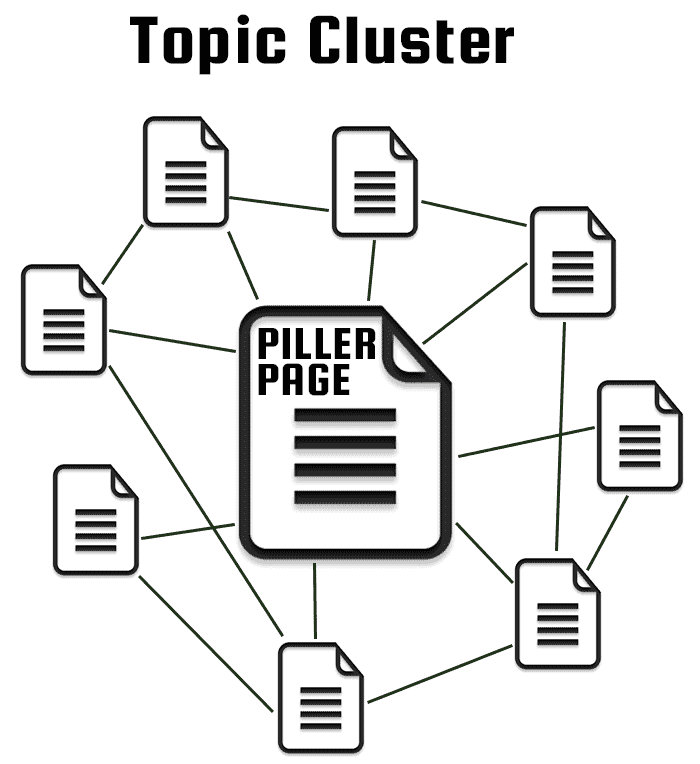Neil Patel has published a nice blog post on the concept of creating pillar pages, improving their SEO and in the process improving the overall SEO of your website.
In the beginning of the blog post he has also referred to an older Hubspot post that explains in detail how they have been able to help one of their clients improve their search engine ranking for their chosen keyword through a pillar page in particular and topic clusters in general. I had come across this Hubspot blog post a couple of months ago and had been wanting to write about it but somehow, lost the thread while trying to handle other topics on my blog and website.
The Hubspot blog post explains why creating topic clusters are important due to the way people use search queries these days.
Content marketers and search engine optimization experts believe that, due to the complexity and quantity of content available on the web, search engine users don’t use single-word queries. An average query these days consists of 4-5 words.
One reason is, as mentioned above, there is plenty of useless content available on the web and hence, users want to make sure that they give the search engine as much information as possible to zero-in on the right search results.
After all, as this blog post suggests, if you run a query on Google, you may come across billions of search results. But frankly, not many people go beyond the second or the third search results page unless he or she is doing some really important research and there is no other option but to scour through as many search results as possible.
The point is, if you are competing with “billions of search results”, you need to do something exceptional, something that is not possible for most of the people to achieve, to move your rankings to the first page or at least the second page.
The second reason is that more and more people are using voice to search, mostly on their mobile phones. So, when people speak into their mobile phones, they mostly use phrases, day-to-day expressions, to carry out the search instead of single keywords. Something like, “find the best barber near me” or “where is the nearest eating joint selling vegan food”.
I have written multiple times on my blog that writing to improve your SEO is just one aspect of content publishing and content writing. The other aspect is, writing for your ideal persona. The search engines will be ranking your content, but it will be the human beings who will be reading it and then basing their decisions on how they react to your content.
Creating and maintaining topic clusters allows you to gather relevant and interrelated bits of information around a single source and hence, increase the subject-authority of your website or blog.
What are topic clusters?
A cluster means, a sort of a grouping. It’s coming together of different components of an environment or a topic. The same applies to topic clusters.
Google is constantly looking for authoritative, specialized content. It wants its users to be able to find as much information as possible through a single source, through a single link. For this, Google wants to showcase authority content.
How does it know that you have “authoritative, specialized” content?
One way of finding that out is, of course when your content is being referred to and responded to by lots of people on the Internet in general and social networking websites in particular.
But when it comes to on-site SEO, it means having lots of good quality content around your chosen topic.
Let’s take an example of my website. Suppose I want to increase my search engine rankings for the keyword or key phrase “SEO content writing services“.
The normal route would be creating lots of web pages and blog posts on my website including the search term “SEO content writing services” – I’m still using this method and I need to explore the concept of creating topic clusters more. I will share my progress on this later.
So, I will create lots of blog posts and articles talking about the various aspects of SEO content writing including
- What is SEO content writing
- Why SEO content writing is important
- SEO content writing doesn’t mean low quality content
- How to write SEO content
- How to target different markets with SEO content
- How does Google deal with your SEO content
- What type of SEO content writing services I provide
- How I can help you improve your SEO with my content
- What is my SEO content writing methodology
- How much I charge for my SEO content writing services
The list can go on and on.
The problem with the traditional method is that all the blog posts, articles and web pages that you create around your chosen keyword or search term are isolated and scattered. They’re not connected with each other. They’re not part of a cluster. The search engines will crawl them and index them as separate entities.
This sort of content arrangement gets lost in all the hubbub that fills up the Internet.
This sort of content management worked previously because there wasn’t lots of content on the Internet and not many businesses were using content marketing to promote their businesses. Now that content marketing has gone mainstream every business and individual want to use it and hence, your content authority needs to stand out. This you can achieve by creating content clusters, or topic clusters.
The important components of a topic cluster are
- The web page containing an introduction to the main topic, in my case that would be “SEO content writing services”
- A cluster of blog posts and webpages – on my website as well as on other websites like Medium, Quora and LinkedIn – that lead to the main web page and to each other
Hence, it becomes a cluster.
What is a pillar page?
A pillar page is the main web page to which every other web page, blog post and article links. This is the web page or blog post you want to optimize.
As explained above in the topic cluster section, pillar page exists at the center of your topic cluster. It is the main topic you want to cover. Everything else links to it and it links to everything else. It becomes an Oracle of knowledge about the topic or the search term.
How does creating topic clusters and pillar pages improve your search engine rankings?
Search engines like Google are constantly looking for authority content. They want to provide high-quality information to search engine users.
Since search is becoming very complex Google prefers sources that are packed with very useful and relevant information.
The information doesn’t just have to be useful and relevant, it also needs to be arranged in such a manner that it is easier to consume and understand.
Modular information is easier to consume and understand.
When you create topic clusters you create lots of content pieces and then join them around your pillar page. Your pillar page becomes a sort of a hub for all the information relevant to that particular topic.
Creating topic clusters solves two purposes:
- It makes you write/create/gather lots of information around a single topic covering every possible subtopic
- It makes it easier for users to navigate through the entire spectrum of the topic through hyperlinks
This further boosts your SEO.
Since all the pages and blog posts are interconnected, even if a single link gets an SEO boost it has a trickle-down effect on all the connected links.
Also, since lots of web pages, blog posts and articles – on your website and outside of your website – are connecting to your pillar page, Google begins to think that it is a very important page about your chosen topic and hence, begins to improve its search engine rankings.


